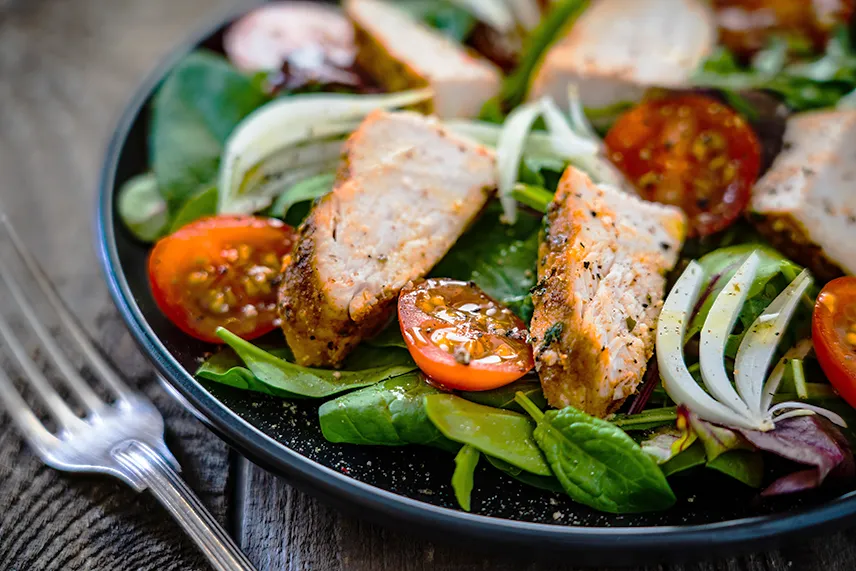Dr. Nowzaradan Diet: What Exactly Is It?

Losing weight can be a challenging journey. Many people struggle to shed pounds without a specific diet plan in place. With so many diet plans around, it’s no wonder that some need help figuring out where to start. You might come across the Dr. Nowzaradan diet when searching for a low-calorie diet.
The Dr. Nowzaradan diet plan is renowned as an effective weight loss program, thanks to the popular TV show “My 600-lb Life.” Although the diet promotes fast weight loss, it is designed specifically for those preparing for weight loss surgeries.
It is a unique weight loss plan with a strict set of rules. In this article, we bring you everything you need to know about Dr. Nowzaradan’s diet plan, including how it works, who it’s for, its benefits, and its drawbacks.
What Is the Dr. Nowzaradan Diet?
The Dr. Nowzaradan diet is a restrictive low-calorie diet created by famous bariatric surgeon Dr. Younan Nowzaradan, also known as Dr. Now. Dr. Nowzaradan’s diet plan comprises low-calorie, low-carb, and low-fat foods and prioritizes foods with higher amounts of protein and fiber.
The diet plan focuses on reducing calorie intake to around 1,200 calories, split evenly between 2–3 meals per day. So, you can eat two meals with 600 calories or three meals with 400 calories each. It excludes snacks but doesn’t eliminate any food groups other than sugar.
Dr. Nowzaradan designed the diet for preoperative weight loss in morbidly obese people. The idea is that patients follow a restrictive diet to lose weight and reduce the risk of complications during and after surgery. It helps ensure individuals are capable of leading a healthy lifestyle post-surgery.
Dr. Nowzaradan’s diet plan books
The Dr. Nowzaradan diet is detailed in his book “The Scale Does Not Lie, People Do.: Reversing Obesity Now.” This book documents Dr. Nowzaradan’s experiences in treating patients with obesity. It serves to help others battling obesity overcome the challenges of the disease.
Inside, you can find the tools to help you make necessary life changes to improve your overall health and ultimately live a happier, healthy life. It educates readers on nutrition and the different types of weight loss surgery. It also provides insight into the psychological aspects of overeating.
Who Is Dr. Nowzaradan?
Dr. Younan Nowzaradan is an Iranian doctor specializing in bariatric surgery, which covers a variety of weight loss surgery procedures performed on people with morbid obesity. The internationally-known weight loss surgeon is also a recognized TV personality and author.
Dr. Nowzaradan is best known for appearing on the reality TV show “My 600-lb Life,” which follows the fat loss journey of his patients. He helps morbidly obese people reach a healthier weight with his tailored 1,200-calorie diet plan that promotes rapid weight loss before surgery.
Foods to Eat
Unlike many restrictive diets, Dr. Nowzaradan’s diet does not exclude any essential food groups. Participants can enjoy a range of their favorite foods. However, the diet plan does promote healthy food habits and prioritizes low-calorie, low-fat, high-fiber, and high-protein foods.
Below are some examples of foods to include in your meal plan:
- Low-calorie, non-starchy vegetables such as spinach, broccoli, cauliflower, celery, and kale
- Low-sugar fruits like berries, grapefruit, and honeydew
- Lean protein sources, including grilled chicken, turkey breast, fish, tofu, egg whites, and plain Greek yogurt
- Whole grains, such as brown rice, whole-wheat bread, and whole-wheat pasta
- Low-fat dairy products, such as skim milk and low-fat Swiss cheese
- Some nuts and seeds, such as chia and flax seeds
Foods to Avoid
To lose weight with Dr. Now’s diet plan, participants must eat a well-balanced diet focusing on nutritious foods. Those following the diet plan should cut out sugar entirely and limit processed and high-calorie foods that do not benefit the weight loss journey.
The following foods are not permitted:
- Sugary foods, including cakes, candy, and ice cream
- Highly processed and packaged foods, such as chips, waffles, white bread, and frozen meals
- High-sugar fruits and fruit juices, like canned fruit, mangoes, and watermelon
- Fried foods, such as fried fish and french fries
- Energy drinks and sugary soda, including cola, lemonade, and fruit punch
Benefits of the Dr. Now Diet
So, is the Dr. Now diet a fad, or does it bring some legitimate benefits?
There are two main benefits that we can identify from this eating plan.
#1 Speeds up weight loss
The primary goal is to help people lose excess fat in a short space of time. In “My 600-lb Life,” Dr. Nowzaradan’s diet successfully helps people weighing over 600 pounds to lose substantial weight. What’s more, it does so while allowing you to follow a reasonably well-balanced diet.
Reducing daily calorie intake is the most crucial factor for weight loss and maintenance. It helps create a calorie deficit, whereby you eat fewer calories and burn more calories via physical activity. If you consume more calories than you burn, you gain weight.
#2 It only excludes sugar
Many restrictive diets eliminate certain foods. The Dr. Nowzaradan diet plan recommends low-calorie and low-carb foods, but it only excludes sugar entirely. You can continue to eat a range of nutritious meals that include all major food groups without breaking the diet’s rules.
Aside from aiding weight management, cutting out sugar or reducing your intake has multiple health benefits. It can help improve your heart health, support glycemic control, boost skin health, and promote healthier teeth.
Cons of the Dr. Now Diet
Every restrictive diet comes with risks, and the Dr. Nowzaradan diet plan is no different. Losing weight might be your priority, but you should never jeopardize your health to slim down. It is critical to weigh the pros and cons when searching for an effective diet plan.
Below, you can find three drawbacks to consider carefully before attempting the 1,200-calorie diet.
#1 Possible malnutrition
The Dr. Now diet calls for a significant reduction in daily calorie intake. The 1,200-calorie diet is excessive. Calorie restriction of this kind often eliminates essential nutrients from your diet. While it prioritizes nutritious foods, it doesn’t provide enough nutrients for your body to function.
Reduced dietary intake is a primary cause of malnutrition in adults. Nutrient deficiencies can cause various adverse side effects, affecting muscle function, immune function, and wound healing. It can also trigger mental health issues, including self-neglect, depression, and anxiety.
#2 Can lead to rebound weight gain
The 1,200-calorie diet is not sustainable for most people. Additionally, the severe calorie restriction can cause you to regain any lost weight at a later date. It can slow your metabolism, which means you will burn fewer calories at rest, making it more difficult to win your weight loss battle.
#3 Might cause changes to the gut microbiota
Very low-calorie diets may cause an imbalance in the gut microbiota, resulting in gastrointestinal issues such as constipation and diarrhea. Maintaining good gut health is essential for optimal health and digestive function while supporting your weight loss journey.
What You Have to Know Before Starting This Diet
Before attempting the Dr. Now diet plan, you need to know that this is not your average weight loss diet.
It is only a short-term method proposed before bariatric surgery, such as gastric bypass surgery. It is not a sustainable diet for those looking to achieve long-term fat loss. While the speedy results might sound appealing, the diet plan is not particularly healthy overall.
Secondly, it is a highly restrictive, extreme diet that you should not carry out without medical supervision. It is purposefully designed and is not recommended for the masses.
Rapid weight loss can be dangerous to your overall health. If you are not preparing for surgery, you should implement a more sustainable approach to losing weight. That way, you can gradually reach your ideal body weight without harming your physical and mental health.
Dr. Nowzaradan Diet vs. Other Diets
Are you considering a diet to help you shed some pounds?
If so, you’re probably overwhelmed with the options available. Here, we discuss the differences between the Dr. Nowzaradan diet plan and two other popular dietary methods – the ketogenic diet and intermittent fasting. Let’s review the pros, cons, and main principles of each.
Dr. Nowzaradan diet

Advertisement
Dr. Nowzaradan’s diet is a 1,200-calorie diet developed for preoperative weight loss. It is low in carbs and fat and high in protein and fiber.
Ketogenic diet

The ketogenic diet is a high-fat, moderate-protein, low-carb diet. It shares similarities with many other low-carb diets, such as Atkins. It requires a drastic reduction in carbohydrate intake, and a significant increase in daily fat intake, ideally from healthy fat sources.
The keto diet pushes the body to get into ketosis – a metabolic state by which you start burning fat for energy.
Intermittent fasting

Intermittent fasting involves cycling between eating and fasting for scheduled periods. There are no restrictions on what you can and can’t eat, and it promotes weight loss by naturally reducing your calorie intake. It also helps your body into ketosis to activate fat-burning processes. Many variations of the method make it easier to find a viable eating pattern to fit your lifestyle.
A Word From a Nutritionist
Losing weight is important if you carry excess fat, particularly visceral fat, which surrounds the internal organs. Obesity and being overweight are associated with many health problems, including cardiovascular disease, high cholesterol levels, and insulin resistance.
Reducing your calorie intake is an essential strategy as it helps you create a calorie deficit. However, you don’t need to follow an extremely low-calorie diet plan to see results.
Stalled weight loss is frustrating, no matter if you want to lose belly fat, thigh fat, or overall body fat. While you might be tempted to try an extreme diet to kick things up a notch, you must be mindful of the risks. Many diets can have adverse effects and may even cause weight gain.
The best way to drop your body weight is to lead a healthy life. That means moving your body regularly and eating a good diet. Try to incorporate nutrient-dense foods with lean protein and heart-healthy fats. Fruit, vegetables, fish, whole grains, nuts, and seeds are all good examples.
Keep in mind that any severe diet can trigger disordered eating patterns. Talk to your doctor if you find it tough to lose weight or manage your diet. They can advise you on the best course of action. This is especially important if you are trying to lose a substantial amount of weight.
Conclusion
The Dr. Nowzaradan diet plan is a unique, 1,200-calorie diet created for rapid weight loss purposes in medical settings. Morbidly obese people may benefit from this diet under a doctor’s supervision to mitigate complications during and following weight loss surgeries.
Outside of these situations, this diet is best avoided as it poses health risks. It is always better to lose weight slowly so you can maintain it for good through healthy living. You can focus on getting regular physical activity each week and eating more healthily to lose weight sustainably.







Comments (0)